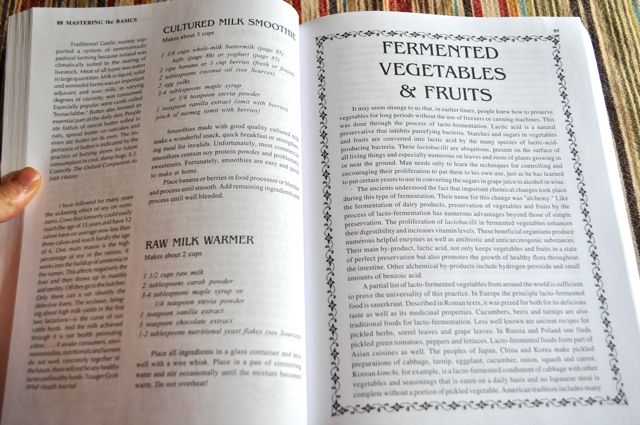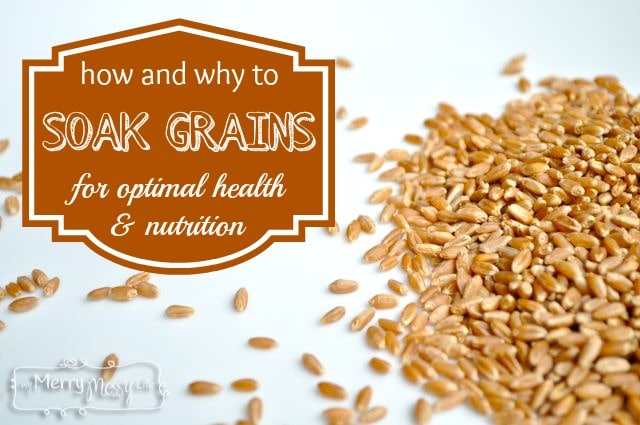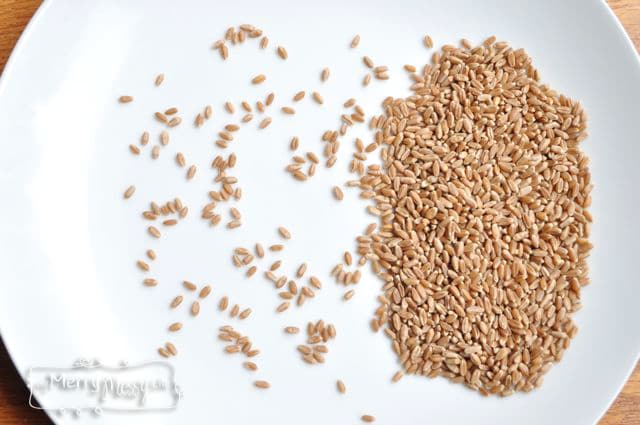How and Why to Soak Grains and Legumes for Optimal Health and Nutrition
So many of us in the Western world today are overfed and malnourished. It's manifesting in obesity and diseases including everything from eczema to autism, to diabetes, cancer, heart disease, arthritis and even anxiety. We eat food that is simply adding calories and chemicals to our bodies, but not providing the minerals and vitamins we so sorely need. Even those who do eat healthy find they have health problems as they consume food that is laced with pesticides, hormones, antibiotics and more, blocking the absorption through the gut lining of the good that is in the healthy food they are eating.
But not all hope is lost. I don't want to cast guilt or condemnation because I've been there, too. I was struggling with food, having stopped eating healthy once I got pregnant with my third child and my health started declining fast (no longer the whipper-snapper I used to be). Read about my journey to real food here. You CAN take charge of your health and life and be better for it, I'm living proof and so are many others who are eating real food.
But one topic I don't often hear being discussed, even in natural, organic, real food circles is the ancient and very important art of soaking and fermenting grains and legumes.
Soak to Break Down Phytic Acid
Phytic what? Yeah, I know, it was a totally foreign concept to me not so long ago, too. But stick with me – this is fascinating!
Since buying the Nourishing Traditions cookbook, I have really been enlightened on how to properly prepare food so it is both easily digestible and nourishing. Part of that is the ancient process of soaking and fermenting grains and legumes – that's rice, corn, wheat, oats, barley, spelt, lentils, beans, and everything in between. Why? To break down phytic acid, an organic acid that lies in the outer layer or bran of a grain. In the cookbook, Dr. Sally Fallon writes,
“Untreated phytic acid can combine with calcium, magnesium, copper, iron and especially zinc in the intestinal tract and block their absorption. This is why a diet high in unfermented whole grains may lead to serious mineral deficiencies and bone loss.”
Dr. Fallon goes on to write that grains speed up the digestion process in the colon at first, but can lead to digestion problems later on (irritable bowel syndrome, ulcerative colitis, or even just eczema) as it builds up in the system and irritates the gut lining.
Soaking also neutralizes enzyme inhibitors, which stops the process of breaking down the food we eat, and we no longer absorb the nutrients we need for cell growth and repair. Soaking encourages the beneficial enzymes to produce, therefore making our food easier to digest and allowing our bodies to actually absorb (instead of eliminate) the vitamins and minerals in our food.
How to Soak and Sprout Grains and Legumes
So why did we stop soaking? For convenience's sake, of course. It takes time and it's harder to mass produce. But it's so easy – the grains soak and ferment without any help from us. I just had to get in the habit of planning the night before to soak what I need for the next day. For instance, if I know we want oatmeal for breakfast the next morning, I make a note to start soaking the morning before.
Grains
- Take a glass or stainless steel bowl (plastic often contains BPA), and pour your grains in it
- Cover the grains (either freshly ground or whole, doesn't matter) with warm, filtered water
- Pour about one tablespoon per cup of grain of any of the following: whey, yogurt, apple cider vinegar, lemon or lime juice (freshly squeezed)
- Cover with a dishcloth and let sit on the counter at least 7 hours or longer (longer is better). I've soaked up to 24 hours before.
Legumes
Follow the same protocol above, but it isn't necessary to add the tablespoon of acidic liquid to it unless cooking black beans. Beans must also be cooked longer than grains, which I use my slow cooker to do.
Sprouting
You might notice, if they soak long enough, that the grains split open and you see tiny sprouts growing. This is a sprouted grain and is even better for digestion!

Which Grains Should We Soak?
Wheat, barley, rye, corn and oats are the hardest to digest and should be soaked. But corn should be soaked in lime water as it releases the vitamin B3 that is bound in the grain.
Dr. Fallon writes that soaking isn't as necessary for buckwheat, rice and millet because they contain lower amounts of phytates. But she does suggest cooking them slowly for two hours or more in a homemade broth that is high in minerals and gelatin.
Are you already a soaker or feel confident you can add this to your family's routine? Then take it a step further and start fermenting your grains, too! That will add probiotics to your grains and make them not only fully digestible, but be a boost to your immune system. Check out this post on how to ferment your grains!
Breakfast Cereals and Granola Bars Are Not Health Foods
This is why we no longer eat store-bought breakfast cereals, crackers and pasta because the grains have not been properly soaked and fermented. I know, I know, that is NOT fun. I used to LOVE love love eating cereal in the mornings, and so did my kids. Not only are they full of phytic acid, but they are made by a process called extrusion which heats the grains at very high temperatures, thereby removing most of the naturally occurring vitamins and minerals, so they add them back in man-made form, which our bodies recognize as not being real.
But we did make the transition and are much healthier now! I lost weight and am back to my pre-FIRST baby size (I have three!), and we get sick less often. We have replaced cereal with egg frittatas, grain-free waffles made with almond and coconut flour, banana pancakes, bacon and more! Or, you can make your own – check out this great recipe from The Healthy Home Economist. I also have my own recipe I'll be sharing soon that is delicious and very easy to make!
I buy Bob's Red Mill Gluten Free Oats for our oatmeal and Einkorn Wheat Berries as they are more like the original wheat, before GMO's (although I'm still on a grain-free diet right now, I do prepare grains for my family).



I’m so glad I came across your website! We have been pursuing healthful eating for about 7 years now and working with a chiropractor/NRT practitioner BUT with three kids and homeschooling, I find it difficult to choose healthful over convenient sometimes. I’m looking forward to trying your recipes and tips.